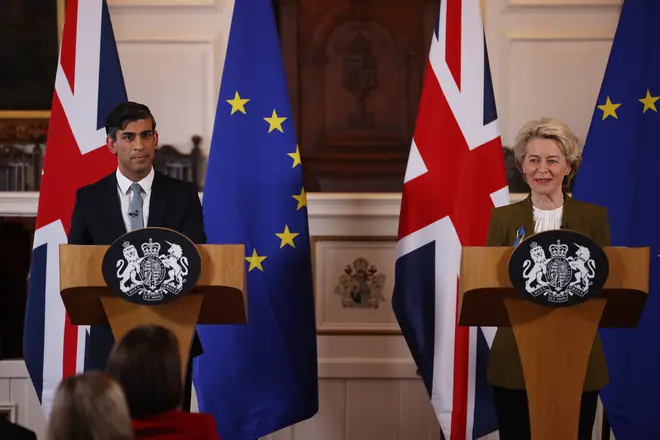
Shelagh Fogarty 1pm - 4pm
27 February 2023, 15:49 | Updated: 27 February 2023, 16:14

The UK and the European Union have agreed a brand-new Brexit deal to resolve issues with the Northern Ireland Protocol left after Britain's departure from the bloc.
Rishi Sunak and European Commission president Ursula von der Leyen hashed out the final details of the agreement today with the treaty intended to smooth issues which have arisen since Britain left the EU in 2021.
The most-notable part of the new deal is the reorganisation of the trade status of Northern Ireland.
Under the Good Friday Agreement, there must be regulatory alignment between Northern Ireland and the Republic of Ireland and as part of Boris Johnson's NI Protocol agreed as part of the departure, this meant that there is effectively a customs border between Great Britain and Northern Ireland.
This situation has meant there are cumbersome levels of paperwork involved with importing Northern Irish goods to Great Britain and vice-versa, with several items including sausages and seed potatoes technically banned from the province.
Today we are changing the Northern Ireland Protocol and announcing the new Windsor Framework.
— Rishi Sunak (@RishiSunak) February 27, 2023
This agreement:
🔁 Delivers smooth flowing trade within the whole UK
🇬🇧 Protects Northern Ireland’s place in our Union
✅ Safeguards sovereignty for the people of Northern Ireland pic.twitter.com/fy8JS1QDLR
Read more: King Charles will meet Ursula von der Leyen 'for tea' before new Brexit deal announced
Read more: Rishi Sunak warned by Boris Johnson that dropping NI Protocol Bill would be 'great mistake'
The deal, to be announced today, will introduce a new system in which a so-called "trusted traders" scheme will allow frequent importers to avoid all checks when moving goods to NI from the Republic.
It also allows traders to avoid most paperwork for goods which arrive in Northern Ireland as part of a "green lane", while goods which are moving on subsequently to the Republic will be subject to checks and paperwork as part of a "red lane" to ensure the integrity of the EU's internal market.
One concession which the UK has offered the EU to sweeten the deal is access to British data over trade traffic in the Irish Sea which is intended to prevent smuggling goods.

The current agreement means that the UK Government cannot legislate on certain issues where the EU's single market rules take supremacy - including on alcohol duty and VAT relief on solar panels which has caused issues since Brexit.
The new deal is expected to have EU regulations be disapplied in Northern Ireland and have it follow British state aid rules.
But this comes at cost for Mr Sunak, as he was forced to concede his demand that Northern Irish companies be able to choose whether they follow UK or EU rules.
This means that Northern Ireland will be partially under the remit of the European Court of Justice - a concession which is likely to anger ardent Brexiteers.
The Stormont Assembly will also be given a so-called "brake" to object to new EU regulations being applied in Northern Ireland despite a small amount of existing EU legislation still applying under the so-called Windsor Framework which prevents a hard border being implemented between the UK and Republic of Ireland.